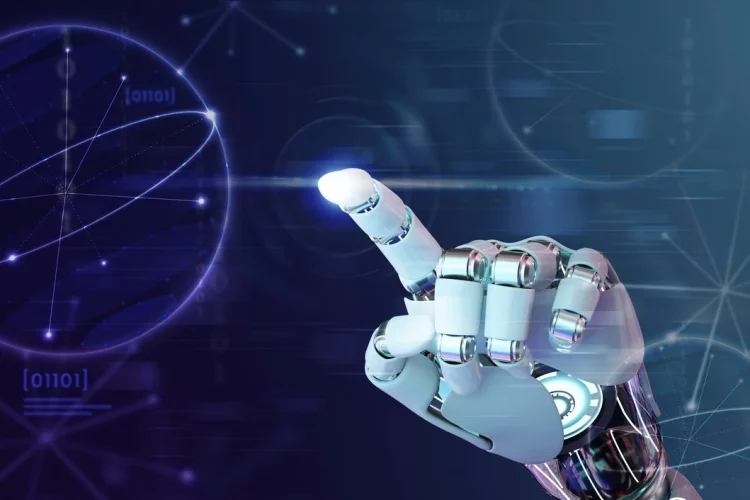The rapid advancement of artificial intelligence (AI) technology is one of the most transformative trends of the 21st century. AI, once a futuristic concept, has now become a core driver of innovation across a wide range of industries, from healthcare and finance to transportation and entertainment. As AI continues to evolve and become more integrated into our daily lives, there is growing concern and curiosity about its potential impact on the global job market.
AI’s capabilities have expanded beyond simple automation of repetitive tasks to more complex functions, including decision-making, problem-solving, and even creativity. These developments prompt important questions: Will AI create new jobs, or will it render existing roles obsolete? How will workers need to adapt to this new technological landscape? In this article, we will explore the various ways in which the rapid development of AI could reshape the future job market, examining both the challenges and opportunities that lie ahead.
1. Job Automation and the Displacement of Certain Roles
One of the most significant concerns surrounding AI’s impact on the job market is its potential to automate jobs that have traditionally been performed by humans. While automation is not a new phenomenon, AI’s increasing sophistication allows machines to perform tasks that were once thought to require human intelligence.
A. Routine and Repetitive Jobs at Risk
AI and machine learning (ML) systems excel at performing routine, repetitive tasks quickly and accurately. Jobs that involve simple, predictable work are at the highest risk of being automated. Examples of such roles include:
- Manufacturing and Assembly Line Jobs: Robots and automated systems are already replacing humans in various stages of manufacturing, including assembly, quality control, and packaging. AI-driven machines can work tirelessly and with greater precision than human workers, leading to cost savings and higher efficiency for companies.
- Customer Service and Data Entry: AI-powered chatbots and virtual assistants are increasingly taking over customer service roles, handling inquiries, troubleshooting issues, and providing support 24/7. Similarly, AI algorithms can perform data entry, scheduling, and administrative tasks with greater speed and accuracy than humans.
- Transport and Delivery: Autonomous vehicles, including trucks, drones, and delivery robots, are being developed to replace human drivers. This could have a significant impact on industries such as logistics, transportation, and delivery services.
While automation will likely lead to job displacement in these sectors, the overall impact will depend on how quickly industries adopt AI technologies and how society responds to these changes.
2. Creation of New Jobs and Industries
While some jobs will inevitably be displaced by AI, the technology is also expected to create new roles and even entire industries that do not currently exist. As AI becomes more integrated into various sectors, there will be an increasing demand for workers who can develop, manage, and maintain AI systems.
A. AI Development and Engineering Roles
As AI technology evolves, the demand for skilled professionals in AI development and machine learning will grow exponentially. Some of the new roles that will emerge include:
- AI and Machine Learning Engineers: These professionals will be responsible for designing, building, and optimizing AI systems and algorithms. Companies will need a large pool of engineers skilled in programming languages, statistical modeling, and data analysis to develop cutting-edge AI tools.
- Data Scientists and Analysts: AI systems rely heavily on large datasets to train algorithms. Data scientists and analysts will play a key role in cleaning, structuring, and interpreting data to ensure that AI systems function effectively and make accurate predictions.
- AI Ethicists and Policy Makers: As AI systems become more autonomous, the ethical implications of their decisions will become a critical concern. AI ethicists will be needed to ensure that AI technology is developed and implemented in ways that are transparent, fair, and accountable. Governments and regulatory bodies will also require policymakers to develop frameworks for regulating AI use and protecting privacy.
B. Roles in AI-Human Collaboration
AI is not expected to completely replace humans in all fields but rather to complement human efforts and enable more efficient workflows. In many industries, workers will collaborate with AI systems to improve productivity and decision-making. This will give rise to new types of roles, such as:
- AI-Augmented Healthcare Professionals: AI is already being used to analyze medical data, predict patient outcomes, and assist with surgeries. Healthcare workers will increasingly work alongside AI tools to enhance diagnostics, improve treatment plans, and deliver better patient care.
- Creative Professionals Using AI Tools: In fields like graphic design, music, and writing, AI tools are being developed to assist and augment the creative process. Artists, writers, and musicians will be able to leverage AI to enhance their work, streamline repetitive tasks, and generate new ideas.
- AI Trainers and Supervisors: While AI can automate many tasks, it still requires human supervision and oversight. AI trainers will be responsible for teaching AI systems to perform specific tasks and ensuring that they operate correctly. In fields such as customer service, AI trainers will help AI systems learn how to interact with customers in ways that feel natural and helpful.
These AI-human collaboration roles will require workers to possess a mix of technical skills and domain-specific knowledge. As such, education and training programs will need to evolve to meet the demands of this new workforce.

3. The Need for Upskilling and Reskilling the Workforce
As AI and automation disrupt existing job structures, there will be a significant need for workers to reskill and upskill to remain competitive in the job market. The future workforce will need to adapt by acquiring new skills that align with the demands of an AI-driven economy.
A. Technical Skills and Digital Literacy
In the coming years, digital literacy will become essential for most workers, even in fields that are not directly related to technology. Understanding basic concepts of AI, machine learning, data analysis, and cybersecurity will be valuable assets for workers across various sectors.
For those in technical fields, proficiency in programming languages (e.g., Python, R, Java), data science, and machine learning frameworks (e.g., TensorFlow, Keras, PyTorch) will be highly sought after. Furthermore, expertise in cloud computing, cybersecurity, and blockchain technology will also be valuable in an AI-driven economy.
B. Soft Skills: Creativity, Emotional Intelligence, and Critical Thinking
While AI excels at performing structured tasks, it still struggles with activities that require creativity, empathy, and critical thinking. As automation takes over more routine tasks, humans will be needed to focus on tasks that involve complex decision-making, emotional intelligence, and social interactions. Skills such as:
- Creativity and innovation: The ability to think outside the box and develop new ideas will be crucial in an AI-powered world. AI will assist in the creative process, but human ingenuity will remain at the heart of groundbreaking innovations.
- Emotional intelligence: Roles that require interpersonal communication, empathy, and emotional understanding—such as healthcare, education, and customer service—will continue to rely on humans to build trust and rapport.
- Critical thinking and problem-solving: As AI systems make decisions based on algorithms and data, humans will still be required to assess and make judgment calls when faced with complex situations. This will involve analyzing problems, questioning assumptions, and thinking critically about potential solutions.
C. Lifelong Learning
In the future, the concept of lifelong learning will become increasingly important. Workers will need to continually update their skills and knowledge to keep up with rapid technological advancements. Governments, educational institutions, and businesses will need to work together to provide accessible and affordable reskilling and upskilling opportunities for workers of all ages and backgrounds.
4. The Role of Governments and Policy Makers
The rapid development of AI and its potential effects on the job market present significant challenges for governments and policymakers. While AI will undoubtedly create new opportunities, it also risks exacerbating inequality and unemployment if not managed properly.
A. Addressing Job Displacement
Governments will need to implement policies that help workers transition from displaced jobs into new opportunities. This could include:
- Universal Basic Income (UBI): Some advocates suggest that UBI could provide a safety net for workers whose jobs are automated, ensuring that they can maintain a basic standard of living while retraining for new roles.
- Job Transition Programs: Governments can invest in programs that provide financial support, job placement assistance, and career counseling for displaced workers.
B. Supporting Innovation and Investment in New Industries
At the same time, governments should foster innovation in AI-related industries to create new jobs and economic growth. This includes investing in research and development, supporting AI startups, and providing incentives for businesses that are working to develop cutting-edge AI technologies.
C. Ensuring Ethical AI Development
As AI becomes more embedded in society, it is crucial for governments to regulate its development to ensure that it is used ethically and responsibly. This includes establishing guidelines for transparency, accountability, and fairness in AI systems, particularly in areas such as hiring, law enforcement, and healthcare.
Conclusion: The Dual Nature of AI’s Impact on the Job Market
The rapid development of artificial intelligence technology is reshaping the future job market in profound ways. While AI will undoubtedly lead to job displacement in certain industries, it also presents significant opportunities for new roles, industries, and innovations. The key to navigating this transition will be a combination of upskilling, reskilling, and embracing the complementary strengths of AI and human workers.
As AI continues to evolve, it is essential for governments, businesses, and individuals to work together to ensure that the benefits of AI are widely shared, and that the workforce is adequately prepared for the changes that lie ahead. In doing so, we can harness the potential of AI to create a more innovative, productive, and equitable future.





















